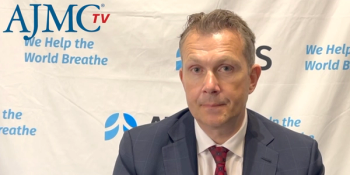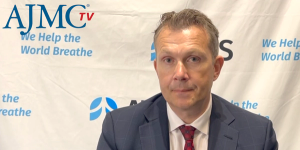
New treatment options for idiopathic pulmonary fibrosis (IPF) and progressive pulmonary fibrosis (PPF) could enhance patient care and monitoring.

New treatment options for idiopathic pulmonary fibrosis (IPF) and progressive pulmonary fibrosis (PPF) could enhance patient care and monitoring.

The latest advancements in idiopathic pulmonary fibrosis (IPF) treatment offer promising efficacy and improved tolerability.

Early diagnosis and treatment are crucial for managing idiopathic pulmonary fibrosis and progressive pulmonary fibrosis, yet barriers hinder timely intervention.

Toby Maher, MD, PhD, professor of clinical medicine, Keck School of Medicine at USC, shares trial findings from the FIBRONEER-IPF (NCT05321069) and FIBRONEER-ILD (NCT05321082) studies on nerandomilast.

Toby Maher, MD, PhD, discusses how delays in treatment for idiopathic pulmonary fibrosis (IPF) can significantly worsen patient outcomes and accelerate disease progression, underscoring the critical need for timely intervention.

Toby Maher, MD, PhD, discusses the various barriers that frequently hinder patients with idiopathic pulmonary fibrosis (IPF) from receiving appropriate treatment and shares effective strategies he has implemented to overcome these challenges.

Toby Maher, MD, PhD, discusses how common signs and symptoms of idiopathic pulmonary fibrosis (IPF) at diagnosis can indicate disease progression, while also identifying key risk factors associated with IPF and emphasizing the importance of modifying certain lifestyle factors to help prevent the disease.

Toby Maher, MD, PhD, discusses how comorbidities complicate the diagnosis and management of idiopathic pulmonary fibrosis (IPF) and influence treatment decisions, highlighting the need for a comprehensive approach in patient care.

Toby Maher, MD, PhD, discusses how idiopathic pulmonary fibrosis (IPF) is diagnosed through specific imaging and tests, with an average diagnosis time that can delay effective treatment, emphasizing that early diagnosis is crucial for reducing disease severity and expanding available treatment options.

Toby Maher, MD, PhD, discusses how idiopathic pulmonary fibrosis (IPF) severely affects patients’ quality of life and daily functioning, with a median survival that underscores the disease’s severity, while also highlighting the substantial financial burden and health care resource utilization associated with managing this condition.

Toby Maher, MD, PhD, discusses how idiopathic pulmonary fibrosis (IPF) is a specific form of interstitial lung disease characterized by progressive lung scarring, which leads to significant respiratory impairment and distinct clinical challenges compared with other interstitial lung diseases.

Published: May 20th 2025 | Updated:

Published: October 24th 2024 | Updated:

259 Prospect Plains Rd, Bldg H
Cranbury, NJ 08512
© 2025 MJH Life Sciences®
All rights reserved.
